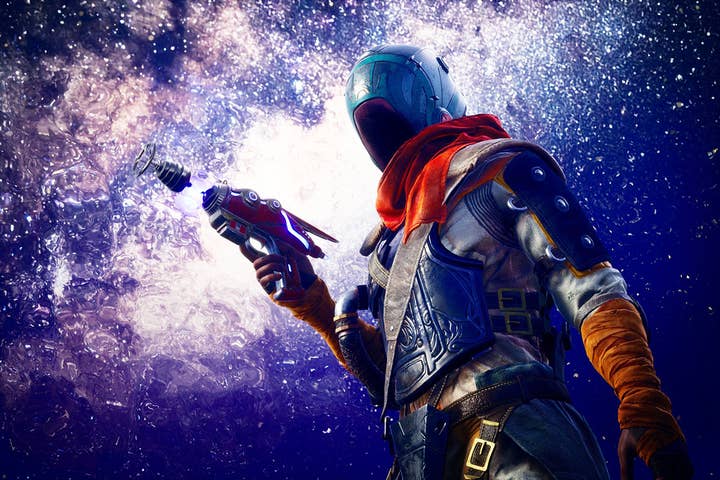Games of the Year 2019
Our favourite games of the year ranged from epic adventures to innovative indie games - plus a couple of Switch hits
In the final two weeks running up to the Christmas break, each member of the team made the case for their favourite game of the year. The selection was varied and ran the spectrum from indie hits made by a handful of people to blockbusters developed by major industry studios -- and now you can read through our picks in one place.
Below you'll find an extract from each of our Game of the Year articles, plus a link to the full piece. Alternatively, you can listen to the latest episode of our podcast to hear more of our thoughts behind each choice. And why not add your own picks in the comments? We've already had notable developers and publishers share their favourites, so it would be great to hear yours.
The Outer Worlds
by Matthew Handrahan
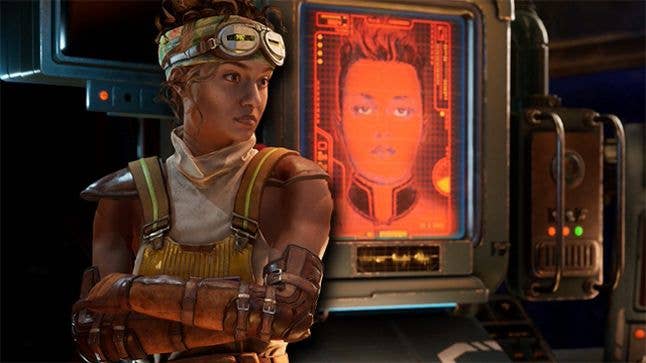
When the last generation drew to a close, I had become a champion for Obsidian, telling anyone who cared to listen (and a fair few who probably didn't) that, if it was given the time and space it had so often been denied by publishers, the studio would obliterate any doubts over its ability to ship a game that wasn't bedeviled by glitches -- the great qualities its games already possessed would shine all the brighter.
Now, Obsidian has done just that many times over in recent years, but never more comprehensively to my mind than with The Outer Worlds. It helps, of course, that there is more than a whiff of Fallout about the game's setting, which retains the frontier atmosphere of Bethesda's revamped series, but swaps nuclear age paranoia for a society built upon and steeped in corporate greed and doublespeak.
The Outer Worlds is a more richly imagined universe than Fallout, more colourful in both its visual palette and its sharply defined characters, who benefit from better line-to-line writing than anything else I've played this year (note: I haven't played Disco Elysium). It would be easy for a game with The Outer Worlds' setting to descend into bleakness and cynicism, and while it certainly has both in its locker, there is a great deal of warmth here for those with a mind to look for it -- those who've played this game will only need to see the name "Parvati" to know exactly what I mean.
The Outer Worlds' strengths are magnified by what some might argue as a weakness. While it's hardly short on content, this is not quite a AAA production in the classic sense; it was made in less time, with fewer people, and on a smaller budget than a game like Fallout 4, and while that means you can't play it for 200 hours, it also means that you don't have to play it for 100 hours to reach a satisfying ending.
Heaven's Vault
by James Batchelor
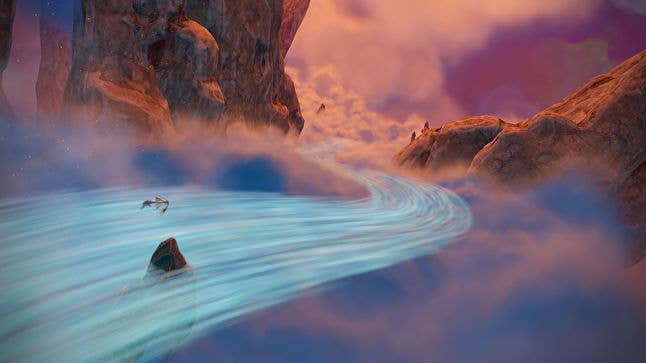
Most video games deal in absolutes. Your character is alive or dead. The door is locked or unlocked. The puzzle solved or unsolved. You win or you lose. Not so with Heaven's Vault.
At the heart of Inkle's wonderful archaeology adventure is an interpretation system built around a fully crafted language, known as Ancient. Most of your time with the game is spent staring at the elegant curves and lines of the game's fictional hieroglyphs, trying to decipher their meaning. Even with suggested words, either based on your previous translations or the context of the inscription, it can be hard or perhaps impossible to complete the puzzle. All you can do is make your best guess.
After you've submitted your translation, the game gives you little to no indication as to whether you have got the answer right. There's no fanfare, no flashy celebration effect, no chime... nothing. You're expected to carry on, unvalidated -- unless, of course, the player character Aliya has confirmed each of the words through multiple previous translations.
It's the lack of absolute verification that makes Heaven's Vault feel special. Everything is a mystery, not just the overall story you're following or the universe you're exploring but every fragment of the past you investigate. It makes every word you gradually confirm as correct feel like a significant victory, especially as they come thick and fast further into your playthrough. You slowly begin to understand the symbols and the way they are used, the commonalities across different inscriptions. You begin to read Ancient, strengthening the link between you and Aliya as you continue her journey.
Divinity: Original Sin II
by Brendan Sinclair
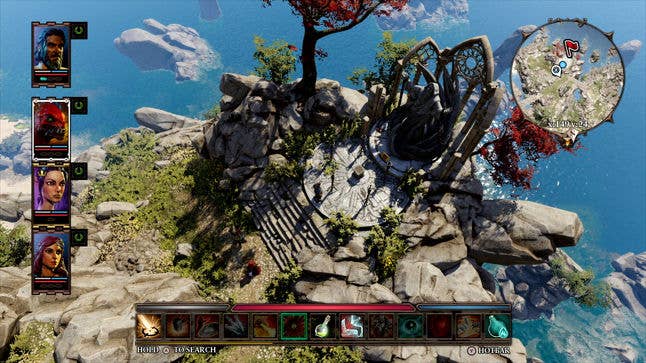
Playing Dungeons & Dragons with Don was like having the guard rails taken away and being given a world that I could truly influence and interact with however I saw fit. And if I did something dumb, or antagonized everyone in my path, or sabotaged the carefully planned storyline, Don would roll with it. The world would react as one might expect, and we would have to deal with the consequences. Sometimes that meant improvised adventures that were every bit the equal of his meticulously prepared campaigns. Sometimes that meant being cursed by a witch to spend your life with a bucket stuck on your head.
That's what playing Divinity: Original Sin II has felt like to me. I don't think any game yet made could be as open-ended and adaptable and brilliant as the best pen-and-paper dungeon master, but Original Sin II consistently has me thinking about the longer-term and bigger picture consequences of my actions. It has me behaving as if the game has a Virtual Don, forever ready to give a gleeful chuckle and roll the dice to bring my latest Bad Idea into reality. And that's something I've never had in a video game before.
I've put more than 80 hours into Original Sin II since it came out on the Switch this year and I haven't even completed my first playthrough yet. I say "first playthrough" because there's obviously so much to this world I haven't seen, so many stories that could play out differently, so many different approaches I could take to combat and puzzle-solving, that it somehow makes the idea of replaying an 80-hour RPG understandable to the point of actually enticing.
Just like Don, Original Sin II packs its world full of intricately crafted yet fragile stories, and refuses to protect them from your actions. The game isn't unfair, and there are plenty of options to make things easier like a variety of difficulty levels and the ability to re-spec your character, but the world itself reacts to the player in the expected way. While the game's narrative casts the player as an avatar of the gods, many of its stories and its systems treat you the way they would any random fool. And that's a refreshing change of pace from an industry that so commonly baby-proofs every user interaction possible.
Untitled Goose Game
by Haydn Taylor
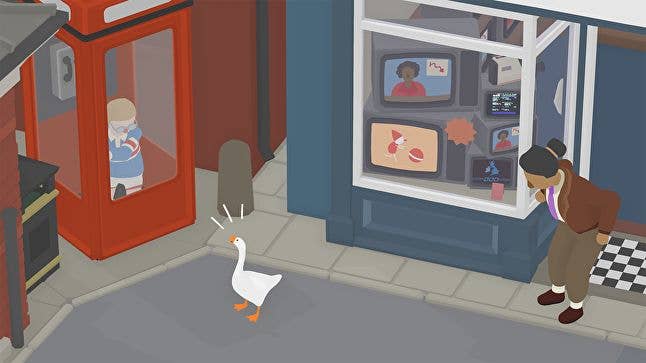
Up until the moment I started writing, I was undecided on my game of the year. On the one side we have Sekiro: Shadows Die Twice, and on the other we have Untitled Goose Game.
Sekiro is another masterful game from Hidetaka Miyazaki, drenched in horror and strange beauty, with all the lingering ruminations about death that I've come to love and expect in a FromSoftware game. It is 100% my bag.
But Untitled Goose Game, which is essentially a joke about a goose which got out of hand, is perhaps the most philosophically interesting game of 2019.
FromSoftware delivering an unparalleled experience in the realm of third-person action games is about as surprising as a tax-evading billionaire. It is exceptional, and almost certainly the "best" game released this year. Despite it all though, Sekiro lacks the magic of games like Dark Souls and Bloodborne -- perhaps because it has the misfortune of succeeding them.
Untitled Goose Game, however, has that magic. Much like Dark Souls, it's ripe for dissection and interpretation. My favourite deconstruction comes from YouTuber Grace Lee, who reads it as being critical of unjust power structures, viewing the goose as a radical agent of change in a world where the presiding school of thought is to maintain the cycle, uphold the status quo.
Eastshade
by Rebekah Valentine
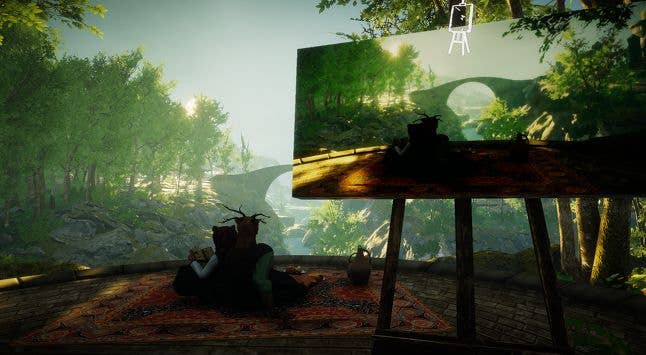
Like the player character in Eastshade, I began 2019 by closing a major chapter of my life and starting, in many ways, entirely fresh. Like them, I packed up my things and moved away from a familiar home on the heels of a particular personal tragedy. Like them, I traveled with the promise that in this new place I would find people, spaces, and resources to grow in my chosen trade.
There, the similarities between myself and the unnamed player character in Eastshade end. I'm not a painter; my new city isn't a verdant island populated by talking bears and monkeys and gazelles; it does not have a secret underground tea drinking society (though if you know of one, you must tell me). I was not thinking, at this game's release in February: "Oh, I am like this character and I should play this game to work through my emotions!" I was thinking that the screenshots on the Steam page looked awfully nice and that a game where you paint things might be interesting. I don't know that it would have affected me the way it did had I gone in actively seeking self-reflection.
The player is not the main character of Eastshade -- Eastshade is the main character of Eastshade. It is a game about a place, as developer Danny Weinbaum told us earlier this year. There is no world-changing plot, no tear-jerking emotional arc, no climax, no denouement. You arrive on the island of Eastshade, you spend ten or so hours falling madly in love with Eastshade, and then you leave Eastshade and that is the game.
And I think it's probably difficult not to fall in love with Eastshade, at least if you're the sort of person who's open to picking up a game where you walk around and paint landscapes in the first place. For one, it's lovely. Weinbaum's background is in 3D environmental art, he appears to be quite good at it, and I'm glad circumstances lined up for him to make a game where he could showcase that.
Sea of Thieves
by Christopher Dring
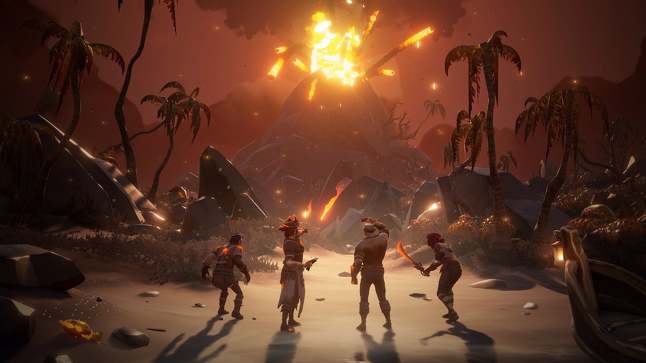
Many AAA developers have stopped making blockbuster interactive movies and are now creating blockbuster interactive TV shows instead. And with that in mind, shouldn't our awards and year-end lists be more like the Emmys and less like the Oscars? If Game of Thrones can win awards every year, why can't Pokémon Go? Or Fortnite? Or GTA Online? Or Rainbow Six? Well, we make our own rules here, so my game of 2019 is the same as my game of 2018: Sea of Thieves.
The first year of Sea of Thieves started slowly but with promise, and ended strongly. The main early criticism of the game at the time was that it was a 'Sea of No Content,' with not a great deal to do after the first few hours of finding treasure, killing skeletons and battling at forts.
That wasn't true by the end of the year, and certainly isn't true in 2019. In March, Rare released its Anniversary Update, giving the game an excellent competitive multiplayer mode, a creepy pirate story and a whole fishing sub-game that might just be the best fishing mode ever made.
The competitive multiplayer mode (or Arena) and the fishing have added something quite important to the game -- the ability to play for a short spell. Sea of Thieves has been one of those games where a 'quick go' hasn't been possible, but an Arena battle will take no more than 30 minutes and fishing is something that can be done immediatley without any real travel (which takes up the bulk of your game time). Fishing is also an entertaining way to experience the game solo, which has been one of the game's biggest drawbacks -- it really is better with friends.
Super Mario Maker 2
by Marie Dealessandri
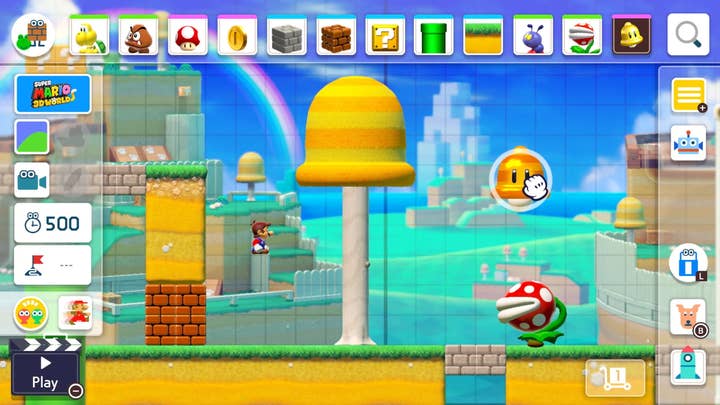
Finding a game of 2019 to write about was surprisingly difficult. However, Super Mario Maker 2 soon became the obvious choice as it's the game I kept coming back to all year, clocking in over 100 hours. It's just everything the original Mario Maker could (and should) have been.
First, the introduction of a story mode added much needed structure and accessibility to the franchise. It's a story mode by name only -- do not expect any compelling narrative here, it is a Mario game after all. However, what it does really well is introduce the player to a myriad of features that were added to this new entry, by offering some truly phenomenal levels. You could buy Super Mario Maker 2 and play the story mode's 100 levels without bothering with the game's creation tools, and it'd still be a great experience. But you'd be missing out on some incredible gameplay elsewhere.
The list of new features in Super Mario Maker 2 is so long I'd need an article just for that, but highlights include the introduction of the Mario 3D World universe, which adds some depth to the series (no pun intended), the on/off switches that the entire community has embraced so massively, but also vertical levels, custom scrolling, clear conditions, new themes, new power ups, more NPC and enemies, and much more.
All of that makes for an absolute dream if you're into hardcore platforming. Playing Mario Maker 2 is spending a lot of time looking at community-created content and at these classic Mario mechanics that we all know (and for some of us love) and thinking: how in the hell has no one at Nintendo done this with it before? The Super Mario Maker community is a fantastic bunch of creative, hardcore platformer players, romhackers, speedrunners and Kaizo level makers, and it's making the levels Nintendo will never be able to make if it wants the franchise to remain accessible. Having a community pushing the boundaries of such an iconic franchise and redefining it is an incredibly exciting thought to me.
